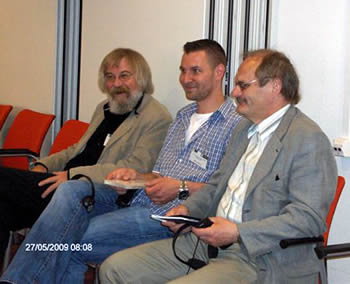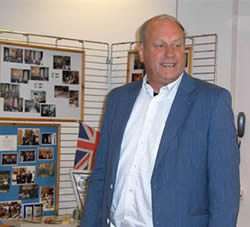1989 and Before
1989 was quite a year, a turning point in the history of Europe. The Berlin Wall was pulled down. Eastern Europe opened up for people to travel, both in and out, and Communism was acknowledged as a spent force politically and economically. In Hungary the Communist government acknowledged that elections should include other parties.

It was against this background that FICE-Hungary was re-established. FICE (Federation Internationale des Communautes Educatives) is the biggest international professional association for people who work with children and young people, and there are organisations which act as its National Sections in about thirty countries.
Because of the way that organisations often follow a cycle, being founded, growing and dying away again, there are times in FICE when National Sections are wound up and times when they are refounded. (There is a Steering Group working on re-establishing FICE-England & Wales at the moment.)
Hungarian children’s communities had been involved in FICE-International from its foundation in 1948, but for much of the period after that the country was represented by an organisation with the backing of the Communist Government. Indeed, it was one of FICE’s achievements that throughout the Cold War a dialogue was maintained between child care professionals in Eastern and Western Europe.
However, with the ending of Communism, a new era came in – politically, economically and socially – and this had a significant impact on services for children and young people and for the child care profession. In Hungary the Communist Government agreed to open elections in 1989 and the Third Republic was ushered in. Child care professionals started to reconsider the future of their profession, and the new Government looked for people who could lead and influence the development of child care.
The people who refounded FICE were first approached by the Ministry. It was in 1989 that FICE-Hungary was inaugurated, and it was in 2009 that this event was celebrated with a conference held at the European Centre in Budapest.
1989 and After
Anyone visiting Hungary in 1989 found a country where the economy was stagnant and there was a massive need to reconstruct the country. Visit now, and – despite the current recession – you will find a busy modern country. In 1989 little Trabants were belching smoky fumes throughout Budapest; now cars are as modern as in any country in Europe. The change in the last twenty years has been dramatic.
This is true too of FICE-Hungary. Its achievements over that period have been considerable. It has had a busy programme of activities for its members. It has provided training and achieved accreditation for the courses it provided. It has arranged visits for members to other FICE countries, which have led to a dramatic re-appraisal of the child care services that should be provided in Hungary. It has been consulted about child care legislation, which was updated recently. It has published a variety of materials – books, reports, bulletins and training material, both originally in Hungarian and translated from other languages.
Indeed, FICE-Hungary has proved to be a model of the way that modest investment by the Government, coupled with energetic leadership within the National Section, can have a dramatic impact on the development of the child care profession and professional thinking. So there was plenty for FICE to celebrate at the conference in Budapest.
Celebration

At the end of May, about fifty FICE-Hungary members gathered at the Budapest European Centre, with its dramatic views of the city – the sweep of the River Danube, Margaret Island, the splendid Parliament building, Fishermen’s Wharf, the Cathedral of St Matthias, the Palace, and Gellert Hill – one of the most beautiful city vistas in Europe. The conference was also attended by a number of speakers and supporters from other countries, including the President of FICE-International, Monika Niederle.
Following a message from the Ministry by Dr Erika Pehr, the start of the conference was retrospective. I spoke from a FICE-International viewpoint, and Dr Julia Blumenfeld gave an account of the way that the National Section had developed and what it had achieved. She spoke about the dramatic impact which a visit to FICE-Netherlands had had, leading to a fundamental reassessment of Hungarian child care methods. In particular there had been very little fostering twenty years ago, and it is now a significant element in the range of provision for children. There has been a reduction in the maximum size of children’s homes.
Other visits to Israel, Finland and Iceland were described by Julia Blumenfeld as “burn-out tours” – incredibly exciting and inspiring. The impact resulted in part from major policy ideas, but in part also from minor – but significant – points such as the respect shown by Dutch staff for the privacy of the children. At one home the children had decided that they did not want any visitors, and the staff respected their decision, which would have been unthinkable in Hungary. Ideas have been developed also as a result of research.
Evaluation
Dr Judith Cseres then ran a session in which participants spoke about their individual experiences as FICE members – the benefits which they had received from the FICE meetings, training programmes, the international visits and the publications, such as Can we help? – guidance for children on health care.
Among the developments which had impressed members were the introduction of craft activities, in which children had enjoyed the chance to be creative, the Children’s Parliament, student placements and trips organised for children. Often it was the small things which had the biggest impact. On visits to other countries, FICE members saw children having their own individual wardrobes, growing vegetables in kitchen gardens, and opening their own mail. In the Netherlands they witnessed a more friendly, open approach to children.
As a centrally-controlled Communist country, child care practice had been uniform and often limiting. The impact of FICE’s visits and activities on Hungarian child care was that a more individualised approach was developed, and staff in children’s homes took more initiative and were given more autonomy. This meant that it became more difficult to develop centralised policy and training, which had to be adapted to the staff’s changing needs.
Children’s Parliament

Miklos Radoszav spoke about the development of the Children’s Parliament, which had been set up to consult with children in care, to listen to their views and concerns, and to create a more child-centred atmosphere within the care system.
The first Parliament met in 2001 and since then there had been fifteen sessions, all held in important buildings in different parts of the country, to demonstrate that the event was being taken seriously. The sessions were reported in the media, feedback had always been positive, and the exposure had changed the public attitude to the care system. Furthermore, the children and young people involved had had to learn how to cope with speaking in public, and a tradition had now gradually built up, giving them confidence. The older hands were now more relaxed about speaking out, and the newer recruits had the model of the experienced delegates.
Issues covered included practical issues such as grants for books, pocket money, problems with college fees and housing allowances, as well as larger policy issues such as the need to place children in homes near to their own families, the mix of age groups in family homes and better aftercare.
Wherever sessions have been held, the local Mayors have been involved, and attention has always been paid to the conclusions of the sessions, both by local authorities and central government ministries.
Assessing Children’s Needs in Finland

Jukka Sirtamo of Finland described a reception home in Vantaa, called Potkuri, which means propeller or pushing force, a suitable name for a place from which children are expected to move with a sense of direction. The home works closely with families, with a key aim being to reduce the amount of time that children need to spend away from home.
Potkuri is a 28-place home in three units, and the children admitted have a range of problems – educational, domestic violence, running away, drugs and alcohol, as well as dysphasia, ADHD, dyslexia, Asperger’s and behavioural disorders. The programme provides a combination of family work, personal counselling for the children, occupational therapy and networking with other agencies to obtain the full picture and develop supportive links for the future.
Usually the process goes through three phases – building up trust between the child and the staff, then assessing the child’s needs and finally organising services to meet the child’s needs.
Interestingly, occupational therapists play a major role in the assessment of the children at Potkuri, not only being involved in a wide range of activities with the children (sports, play, cookery and so on), but also helping the children to devise strategies to cope at school and at home, and carrying out assessment tasks which might be undertaken by residential workers or psychologists in other countries.
Once a week families are ‘confronted’ in their own homes, and networking with partner agencies is used to determine who matters to the family and the child.
Jukka Sirtamo was positive about the outcomes for the children – more trust between families and the authorities, better school achievements, families empowered, fewer children receiving institutional care, and thus, savings on services.
Other Themes

During the remainder of the conference there were sessions on training and on developments in other countries, with Friedhelm Peters explaining the German systems for helping children with special needs, and Anton Tobe reporting on trends in youth care in the Netherlands and a small survey of a dozen other FICE countries. Monika Niederle, as President of FICE-International gave a rousing speech on the potential of FICE, future plans, and the next Congress – in South Africa in December 2010.
FICE-Hungary have achieved much over the lat twenty years on a modest budget and with a modest workforce. Their contribution to the development of better child care has been considerable, however, and it is to the credit of the FICE-Hungary team led by Dr Julia Blumenfeld that so much has been achieved.
